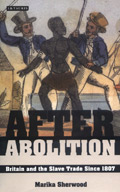You are here: Reports » Phase 1: media » Reviews » After Abolition...
After Abolition: Britain and the Slave Trade Since 1807
Author: Marika Sherwood
Year: 2007
Publisher: London. I.B. Taurus

After Abolition surveys the actions of Britain's merchants and government in the decades after the 1807 abolition of the transatlantic slave trade. Sherwood examines the attitudes of those involved in the arguments for and against abolition and the way in which the slave trade has shaped and informed British society over the last two hundred years.
Sherwood's book appears born out of a desire to shame the historical establishment into further action rather than containing any substantial addition to historical knowledge. Sherwood makes reference throughout the book to the deficiencies of historical analysis, thereby seemingly making a case for the existence of her own work through the non-existence of thorough investigation. Sherwood (2007: 17) accuses historians of participating in a cover-up of enormous proportions, of deliberating obscuring the history of Britain's profiting from slavery long after 1807. For instance, Sherwood (2007: 17) spends a great deal of time assessing the �20 million paid to slave owners after the 1833 Emancipation Act; 'no one has tried to investigate how the �20 million was invested, used to invest in the industrial revolution. Why have historians focused on the profitability of the trade in slaves prior to 1807 and ignored this huge sum of money?' Historians are viewed as products of the establishment, resisting the truth of Britain's complicity in the slave trade (Sherwood 2007: 19); 'most historians of British involvement in the trade in slaves and in slavery laud the Acts of 1807 and 1833...and do not ask the obvious question: were the Acts obeyed.' Whether this is a fair assessment of historians' work is certainly debatable, though Sherwood doesn't actually engage in that debate, significantly avoiding mentioning how historians have 'avoided the issues.'
The reasons and motivations for this neglect are not avoided however; Sherwood makes a clear connection with the inequalities in British society and the perceived absence in historical assessment. Historical analysis is presented by Sherwood as a means of perpetuating these divisions and prejudices; historians carry through the 'institutionalised racism' of British society. 'Historians finish in 1807: Why have they created the notion that the passing of that very famous act stopped Britain from profiting from the slave trade, and from slavery? Is it still not possible to look at British history critically? Thoroughly? And honestly? (Sherwood 2007: 2). This investigation of bias and avoidance is thought to be important for a contemporary examination of British identity. The notion of Britain's largesse in the 1807 Abolition is purged by Sherwood in an assessment that demands that perceptions are revised; 'I am asking what are undoubtedly very uncomfortable questions�but they need to be asked�because of the ongoing debates about "Britishness." Were the British as generous, as selfless, as they have been led to believe they were? Are they to be misled again?' Sherwood assumes that the British public have been duped into believing a certain aspect of a national past. Whilst this not only assumes a rather simplified notion of the consumption of the memory of the historical past within society it furthers Sherwood's case of a history that has been hidden from wider discussion. Sherwood declares Britain and present-day British society to be culpable in both the Atlantic slave trade and its legacies of racism and intolerance. No easy reconciliation is offered for this situation, only a re-examination in the light of these new 'truths.'
Sherwood places her work at the edge of 'institutional' historical analysis. From this vantage point After Abolition angrily examines the circumstances of the way in which the history of enslavement has been written. This is not presented as revisionist history but rather a damning indictment of the failures of others. Sherwood demands that another narrative perspective within historical analysis is included.
